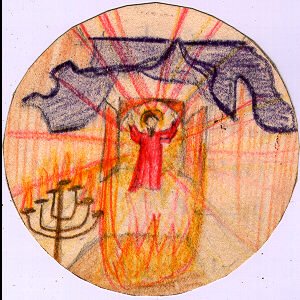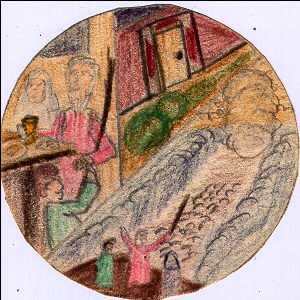Così Giovanni Reale svelava tutti gli enigmi del Simposio:
È scomparso Giovanni Reale. Per ricordarlo pubblichiamo una sua intervista con Giancarlo Bosetti uscita su Repubblica nel febbraio del 2005.
Diceva Werner Jaeger, il grande grecista tedesco, che nessuna parola umana e nessuna analisi critica possono rendere giustizia alla suprema perfezione artistica del
Simposio. Ma questo non ha mai spaventato Giovanni Reale che su quelle pagine di Platone è tornato tante volte nella sua vita, traducendole, commentandole, portandole in teatro, disseminando per ogni genere di collezione, tascabile o accademica, i suoi saggi e le sue annotazioni alle parole del filosofo.
L’amore è un enigma per tutti i mortali, ma nel
Simposio, bestseller più che bimillenario (fu scritto in un anno imprecisato intorno al 370 a.C.), l’enigma diventa un labirinto giocoso di enigmi, popolato di maschere, di messaggi cifrati, di allusioni, di scambi di ruolo, di teorie false presentate per vere e di vere camuffate da false. C’è da perdersi come in un ballo in maschera in cui non si sa più chi è chi e che cosa, se non si dispone di una guida come Giovanni Reale; il quale nel labirinto abita stabilmente con la dimestichezza di un giardiniere che si occupi della manutenzione delle siepi e ne conosca tutti gli angoli. Con il suo aiuto allora vediamo di sciogliere una manciata di enigmi e di togliere la maschera a qualcuno dei personaggi. Chi voglia fare una visita completa dovrà andarlo a sentire in teatro oppure leggere il suo
Eros dèmone mediatore (Rizzoli), dove ognuno dei personaggi del banchetto viene smascherato nella sua funzione scenica, poetica e filosofica.
Togliamo una prima maschera, Reale, quella di Pausania, il politico, quello che distingue tra Afrodite celeste e Afrodite terrestre, amore nobile e amore volgare, amore per gli uomini e per le donne.
«È il retore sofista alla moda, colui che spiega le regole della Atene-bene per l’amore
comme il faut, formula per esteso il
bon ton del corteggiamento, teorizza l’amore pederastico, che è alla base della cultura ateniese dell’epoca, quasi come una legge dello scambio: i favori della bellezza contro la sapienza e la virtù; il giovane conceda i suoi favori per diventare migliore. Ma gli risponderà alla fine del dialogo la scena d’amore (non consumato) tra Socrate e Alcibiade. Il secondo, bellissimo, giovane e potente, voleva. Il primo, sapiente e bruttissimo, no, si nega, e spiega: “Caro Alcibiade, se credevi di scambiare la bellezza straordinaria che vedi in me con la tua avvenenza fisica, tu pensavi di trarre vantaggio ai miei danni. In cambio dell’apparenza del bello, tu cerchi di guadagnarti la verità del bello, e veramente pensi di scambiare
armi d’oro con armi di bronzo”.»
Le tesi di Pausania sono dunque ben presentate ma non accolte da Platone.
«Per Platone Eros e sapienza vanno congiunte ma in un modo differente. Pausania vuol mediare cose non mediabili in quel modo, perché l’Eros sessuale è solo il primo gradino della scala d’amore; l’Eros filosofico va molto più in alto fino a congiungersi con il Bello assoluto.»
E sciogliamo adesso un enigma. Perché Socrate arriva in ritardo al banchetto al punto che devono cominciare senza di lui?
«Socrate si ferma fuori della casa di Agatone perché riceve una ispirazione divina; arriverà a metà della cena, così come il suo discorso arriverà a metà delle pagine del
Simposio. E l’ispirazione era indispensabile – andava rimarcata con il ritardo – perché in questo modo non è lui a confutare direttamente gli altri, distruggendone le idee. Potrà fingere di essere stato confutato lui stesso dalle idee che ha ricevuto attraverso l’ispirazione. Non è solo una questione di eleganza. Un contrasto così forte sarebbe stato dissacratore della sacralità del simposio, avrebbe introdotto una dialettica distruttiva, mentre il simposio deve essere una sinfonia.»
Questo è più Platone che Socrate.
«È infatti un Socrate ricreato; quello vero invece si faceva anche picchiare, per come era a volte urtante, ma Platone vuole che il simposio sia armonioso e che le sue idee passino attraverso mezzi poetici e delicati. E dunque impone a Socrate una doppia maschera.»
Perché doppia? Che cosa deve rappresentare Socrate?
«Socrate finge di fare sue le posizioni di Agatone, il poeta tragico, padrone di casa, reduce da una grande trionfo teatrale che il simposio ha appunto lo scopo di festeggiare. Il discorso di Agatone è purissima musica di parole, Eros è il più bello, il più felice, il più buono degli dèi, e reca una infinità di doni agli uomini, è una guida bellissima e bravissima che tutti devono seguire. Quando poi prenderà la parola Socrate, raccontando il suo incontro con la sacerdotessa Diotima di Mantinea, il gioco teatrale delle maschere farà sì che questa gli parli come se lui fosse Agatone. Ma lui a sua volta si rivolge ad Agatone come se fosse Diotima, mettendosi dunque questa seconda maschera. Per far passare, e trionfare, il suo celebre discorso (quello di Diotima) finge di essere stato confutato, si finge ambasciatore delle confutazioni.»
E il rovesciamento delle tesi di Agatone (come degli altri che spiegano quel che «l’amore non è») lascia il posto al celebre discorso di Socrate-Diotima sul quello che «l’amore è».
«Con la confutazione di Agatone, presentata come il discorso di una veggente, si entra un clima nuovo, si apre il sipario alla presentazione della Verità, veniamo iniziati ai misteri dell’amore, facciamo la conoscenza di Eros come dèmone mediatore, come quello che connette le cose e rende unitario l’essere. Non la bellezza ma la mancanza della bellezza, perché si ama e si desidera ciò che ci manca. Ed è un mito a spiegare la natura di Eros, figlio di Penia e di Poros, della povertà e dell’astuzia, un figlio “ruvido e irsuto e scalzo e senza asilo, che si sdraia sempre per terra, senza coperte, dorme a cielo scoperto davanti alle porte e sulle strade” per parte di madre; e “mirabile cacciatore, che intreccia sempre astuzie” per parte di padre.»
Abbiamo lasciato da parte un altro enigma, quello di Aristofane, uno dei banchettanti. Il suo discorso è quello del mito delle due metà, separate da Zeus. Perché un comico fa un discorso tanto importante nell’equilibrio del dialogo?
«Perché Platone così, ridendo, riesce a dire cose in cui credeva, evitando di essere deriso, perché protetto dalla maschera di Aristofane, la maschera del comico. Forse è questo il momento più magico del dialogo, quello in cui si spiega l’amore come il desiderio di ricongiungersi con l’altra metà. Gli esseri umani erano una unità androgina, che fu divisa in due da Zeus per punirla dei tentativi di assalire gli dèi. Il male nasce dalla divisione, dalla diade e il bene consiste nel cercare di superarla, di fare di due uno. L’amore è nostalgia dell’unità perduta.»
L’altra metà, una tesi anche molto romantica e moderna.
«E che spiega il desiderio di unità e fusione che c’è nella relazione amorosa, spiega come l’incontro degli amanti corrisponda al ritorno a qualche cosa di antico. Ma la forza della poesia filosofica consiste qui nel fatto che Platone allude in modo cifrato alle dottrine interne dell’Accademia, non segrete ma riservate alle comunicazioni verbali, non scritte: l’Uno causa del Bene, la Diade causa del Male. Platone ha due linguaggi: uno per tutti, e uno soltanto per quelli che seguivano le sue lezioni; quando in qualche occasione accettò di esporre a un grosso pubblico la sua dottrina dell’Essere tutti si aspettavano che, arrivato al nocciolo, dicesse che il bene è la bellezza e cose simili. Quando gli sentirono dire che il Bene è l’Uno – ce lo racconta Aristotele – raccolse reazioni di scherno. Quelle idee non sarebbero state bene accolte per molto tempo, fino a Plotino. Il gioco poetico delle maschere era dunque necessario a Platone e gli consentiva di rivelarsi attraverso il sublime, in un linguaggio che riesce a parlare anche agli innamorati di oggi.»
La nostalgia dell’unità perduta nel discorso di Aristofane produce un altro enigma. L’anima degli amanti, dice, parla per enigmi.
«Quando le due metà si ritrovano sono sopraffatte dall’intimità, dall’affetto, dall’amore, e non vogliono più separarsi l’uno dall’altro, neanche per un momento. Questa situazione si presenta come un grande interrogativo. Perché accade? Questo slancio così grande non si può spiegare con un infinito riproporsi dei piaceri amorosi. Spiega Aristofane-Platone: “È evidente che l’anima di ciascuno di essi desidera qualche altra cosa che non sa dire, eppure presagisce ciò che vuole e lo dice in forma di enigmi”. L’inseguimento dell’intero perduto continua indefinitamente, e guarda verso l’ulteriore, l’al di là, il trascendente. Eros porta con sé quest’altra domanda e insieme anche la speranza di un ricongiungimento, che ricostituisca la nostra natura antica e ci renda beati e felici. La sua natura di demone, di intermedio, dà a Eros la sua forza creatrice, lo spinge ad entrare in possesso del Bene per sempre.»
Ultimi due enigmi, almeno per il momento: quello che apre il Simposio e quello che lo chiude. L’inizio: il Simposio è un racconto di terza mano. Apollodoro, che al banchetto leggendario non c’è mai stato, racconta a un compagno di viaggio, Glaucone, quel che ha saputo anni prima da un vecchio amico di Socrate, Aristodemo, che c’era.
«Il significato è chiaro: le dottrine non scritte rischiano di essere tradite nella catena della trasmissione orale. Dunque Platone dice ai suoi: fate attenzione, i racconti vanno controllati, facendo delle verifiche, perché girano versioni lacunose e sbagliate persino su chi c’era e chi no. E poi il simposio viene collocato così in una dimensione leggendaria, come leggendaria è la figura del vincitore della competizione intellettuale: Socrate. Chi lo racconta era bambino all’epoca dei fatti. In questo modo Platone non inventa il banchetto ma lo ricrea trasfigurando qualche cosa di realmente avvenuto.»
E infine quella che lei chiama la «firma d’autore» nelle ultime righe.
«Socrate trionfante a notte fonda costringe Agatone, poeta tragico, e Aristofane, comico, ad ammettere che “è proprio dello stesso uomo il saper comporre commedie e tragedie, e che chi è poeta tragico per arte per arte è anche poeta comico”. I due ciondolavano la testa e crollarono per il sonno. Palesemente nessuno di loro sapeva fare entrambe le cose, uno solo comico, l’altro solo tragico. Con eleganza squisita, senza dirlo, Platone parlava della sua propria arte, della poesia filosofia fondata sul vero. O, se preferite, della vittoria di Apollo su Dioniso.»













